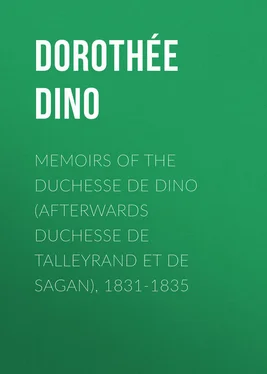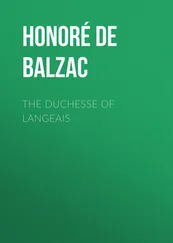Dino Dorothée - Memoirs of the Duchesse de Dino (Afterwards Duchesse de Talleyrand et de Sagan), 1831-1835
Здесь есть возможность читать онлайн «Dino Dorothée - Memoirs of the Duchesse de Dino (Afterwards Duchesse de Talleyrand et de Sagan), 1831-1835» — ознакомительный отрывок электронной книги совершенно бесплатно, а после прочтения отрывка купить полную версию. В некоторых случаях можно слушать аудио, скачать через торрент в формате fb2 и присутствует краткое содержание. Жанр: foreign_antique, foreign_prose, на английском языке. Описание произведения, (предисловие) а так же отзывы посетителей доступны на портале библиотеки ЛибКат.
- Название:Memoirs of the Duchesse de Dino (Afterwards Duchesse de Talleyrand et de Sagan), 1831-1835
- Автор:
- Жанр:
- Год:неизвестен
- ISBN:нет данных
- Рейтинг книги:4 / 5. Голосов: 1
-
Избранное:Добавить в избранное
- Отзывы:
-
Ваша оценка:
- 80
- 1
- 2
- 3
- 4
- 5
Memoirs of the Duchesse de Dino (Afterwards Duchesse de Talleyrand et de Sagan), 1831-1835: краткое содержание, описание и аннотация
Предлагаем к чтению аннотацию, описание, краткое содержание или предисловие (зависит от того, что написал сам автор книги «Memoirs of the Duchesse de Dino (Afterwards Duchesse de Talleyrand et de Sagan), 1831-1835»). Если вы не нашли необходимую информацию о книге — напишите в комментариях, мы постараемся отыскать её.
Memoirs of the Duchesse de Dino (Afterwards Duchesse de Talleyrand et de Sagan), 1831-1835 — читать онлайн ознакомительный отрывок
Ниже представлен текст книги, разбитый по страницам. Система сохранения места последней прочитанной страницы, позволяет с удобством читать онлайн бесплатно книгу «Memoirs of the Duchesse de Dino (Afterwards Duchesse de Talleyrand et de Sagan), 1831-1835», без необходимости каждый раз заново искать на чём Вы остановились. Поставьте закладку, и сможете в любой момент перейти на страницу, на которой закончили чтение.
Интервал:
Закладка:
It seems certain that Dom Miguel and Don Carlos are really leaving the Peninsula, the one for England, the other for Holland.
The Prince de la Moskowa having persisted in his desire to be presented, was presented yesterday, along with the Prince d'Eckmühl. Their desire was so strong that they tried to get Mr. Ellice to present them in the absence of M. de Talleyrand, as if that were possible, apart from its being objectionable! Really, young Frenchmen have no idea how to behave, and Mr. Ellice, whose gentility is of recent growth, had lent himself to this pretty scheme!
Lord Durham and Mr. Ellice are called here, comically enough, "the Bear" and "the Pasha."
London, June 7, 1834. – Lucien Bonaparte has at last reappeared here, and is addressing the French electors from London. After his manifesto to the Deputies last year he disappeared for several months, and is said to have visited France secretly during the recent troubles at Lyons and Paris. His new letter is more turgid than ever, and even more full of literary affectations than the first; is in other ways a most abject production and in very bad taste.
Lucien, whom I had never seen before his arrival in England, as he was in disgrace with the Emperor, was said to be at least as able as his brother, and to have more decision of character. I have heard it said that it was he who saved Napoleon on the 18th Brumaire, and, in fact, I had heard him greatly praised. My actual meeting with him, as often happens, did not come up to my expectations. He seemed to me cringing in his manners and false in his look. He is like Napoleon in the outward shape of his features – not at all in expression. I saw him last year, at a concert at the Duchesse de Canizzaro's, beg her to introduce him to the Duke of Wellington, who was present. I saw him cross the room, and come up bowing and scraping to be presented to the victor of Waterloo, whose reception was as cold as such baseness deserved.
As I live in a London house 17 17 No. 21 Hanover Square, the French Embassy of the period.
celebrated for the great robbery suffered by the old Marchioness of Devonshire, who is its owner, and for a ghost which appeared to Lord Grey and his daughter during their tenancy, I will relate here what Lord Grey and Lady Georgiana have often told me in the presence of witnesses – Lord Grey quite seriously and circumstantially, Lady Georgiana with repugnance and hesitation. It seems, then, that Lord Grey was crossing the dining-room on the ground floor, whose windows look into the square, to go to his own room. He had a light in his hand, and he saw behind one of the pillars by which the room is divided a pale face, which appeared to be that of an old man, though the eyes and hair were very black. Lord Grey at first started back, but on raising his eyes he again saw the same face staring at him fixedly, while the body seemed to be hidden behind the pillar. It disappeared as soon as he moved forward. He searched, but found nothing. There are two small doors behind the pillars and a large mirror between them, so there may well be some natural explanation of the apparition. Lord Grey, however, denies that it was either a burglar or the reflection of his own face in the glass. As a matter of fact, at that time his hair was fair and his eyes are blue. However that may be, he told his family next morning at breakfast what he had seen the night before when he was going to bed. Lady Grey and her daughter thereupon exchanged glances with a meaning look, and Lord Grey asked what they meant. They told him that they had concealed the thing from him till then for fear of being laughed at, but that one night Lady Georgiana had been awakened by feeling some one breathe on her face. She opened her eyes, and saw the face of a man bending over her. She shut them, thinking she was dreaming, but when she opened them again the face was still there. She screamed, and the face disappeared. She then jumped out of bed and rushed into the next room, locking the door behind her, and threw herself half dead with fright on the bed of her sister, Lady Elizabeth. Lady Elizabeth wanted to go and examine the haunted room, but Lady Georgiana would not allow her. Next day the windows, doors, and bolts were found in good order, and what she had seen was pronounced to be a ghost, though the fact that a flat piece of roof comes close up under one of the windows might suggest even to the credulous that some footman in love with one of the maids was the hero of this nocturnal adventure.
Nevertheless, the house has a very bad reputation. I sleep in the room from which Lady Devonshire's diamonds were stolen, and my daughter in that in which Lady Georgiana's ghost appeared. When we came to the house there were actually people who thought us astonishingly brave! At first the servants were afraid to go about the house at night except in couples. To be quite frank, the conviction with which Lord Grey and his daughter described their experiences made me also a little uncomfortable – a feeling which did not wear off for some time.
We have been here nearly three years, and nothing has been stolen and there has been no apparition. Yet once, when we were away in France, and when the door of my room was locked, the housemaid, the porter, and the maids swore that they heard a violent ringing of a bell, the cord of which is at the foot of my bed. They said that they went to the room and found the door locked as it should have been, and when they opened it they could find no explanation of the noise. They tried to make me believe that the bell rang on July 27, 1832, at the very time of my accident at Baden-Baden. A mouse was probably the real cause of this incident.
It is said that Lord Grey's father had a similar and very curious experience; and that Lord Grey himself, besides the Hanover Square ghost, saw one at Howick, which was even more remarkable, but of which he does not care to speak. Of course, this being so, I have not asked any questions about it, but several versions of what happened are in circulation, and the thing has lent itself to caricature.
London, June 8, 1834. – Lord Radnor's extravagant pretensions have put an end to the idea of admitting him to the Ministry. They are now said to be thinking of Lord Dacre, whose appointment would, it is believed, be satisfactory to the Dissenters. The Privy Seal, which is held provisionally by Lord Carlisle, is destined for the newcomer.
When I called yesterday on Madame de Lieven she had just received letters from St. Petersburg which have at last made clear what her new position in Russia is to be. It seems to me to promise well. Instead of being a puppet at Court and groaning under the burden of perpetual ceremonial, the Princess is to have a house of her own. The Emperor wishes that his son shall learn there to know society and how to converse and conduct himself in the world.
This plan is set forth with infinite tact and kindness in a letter from the Empress, which is very happily expressed, perfectly natural, and full of cleverness and affection. Of course it has become a great interest and a great consolation to Madame de Lieven. She sees herself possessed of a direct influence on affairs, and in a position as independent as is possible in Russia. Her imagination is busy developing and improving this new sphere for her energies, and I must say in justice to her that her projects have not a trace of childishness or small-mindedness. She knows exactly what she wants to do, and the lines of her scheme are broad and well thought out. The pleasure she derives from the importance of her prospective position was evident, but anything else would have been hypocritical, and I was pleased that she did not think it necessary to pretend to sentiments she did not feel before me. Her great desire is to render the young Grand Duke the immense service of accustoming him to great and exalted company, to make her house sufficiently distinguished and sufficiently agreeable to accustom every one, including the Emperor and Empress, to enjoy there the pleasures of conversation rather than amusements for which they are perhaps growing too old. Her ambition is to restore to the Russian Court the splendour and the intellectual culture which were its glory under the Great Catherine. She hopes in this way to attract foreigners by exciting their curiosity and providing it with a worthy object. All this fully occupies the Princess, who has it in her to play this part well, though it would be difficult anywhere, and is doubly so in Russia, where thought is as much fettered as speech.
Читать дальшеИнтервал:
Закладка:
Похожие книги на «Memoirs of the Duchesse de Dino (Afterwards Duchesse de Talleyrand et de Sagan), 1831-1835»
Представляем Вашему вниманию похожие книги на «Memoirs of the Duchesse de Dino (Afterwards Duchesse de Talleyrand et de Sagan), 1831-1835» списком для выбора. Мы отобрали схожую по названию и смыслу литературу в надежде предоставить читателям больше вариантов отыскать новые, интересные, ещё непрочитанные произведения.
Обсуждение, отзывы о книге «Memoirs of the Duchesse de Dino (Afterwards Duchesse de Talleyrand et de Sagan), 1831-1835» и просто собственные мнения читателей. Оставьте ваши комментарии, напишите, что Вы думаете о произведении, его смысле или главных героях. Укажите что конкретно понравилось, а что нет, и почему Вы так считаете.












